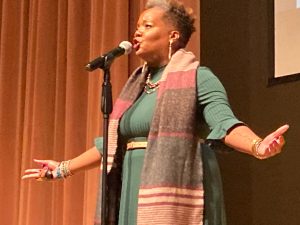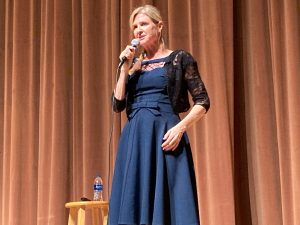
Manón Voice – Courtesy of Shannon Samson. Used with permission.
Throughout my arts writing career, I have primarily covered the performance arts, as well as visual arts and cinema. Storytelling, I have since learned, is definitely also an art form. My maiden journey into the local storytelling scene took place on Saturday when I attended “Bold Lineage” presented by Storytelling Arts of Indiana at Eugene and Marilyn Glick Indiana History Center. The delightful event, which celebrated Women’s History Month, featured distinguished tellers Minton Sparks and Indy’s own Manón Voice, an IU grad, in a 90-minute program of stories, music, poetry and spoken-word artistry.
The program, which was introduced by affable Storytelling Arts of Indiana co-founder Bob Sander, kicked off with Manón Voice, whom I had interviewed previously for the blog, so I had a pretty good idea of what to expect in terms of her material, which was a mix of her own poems and those of others. What I did not expect was the performance element involved in storytelling. Yes, I have attended poetry readings (bad to mediocre) previously and I must admit, they were fairly uninteresting and really not my cup of tea. But this was so very different. As a social justice activist, Voice displayed not only charisma, but was also captivating during her recitals.
Following the theme expressed in the title “Bold Lineage,” Voice first recited “The Idea of Ancestry” modeled after Etheridge Knight’s 1968 poem of the same title. Voice’s poem celebrated the women in her family who influenced and empowered her as Black woman, including both of her great grandmothers, whom she was lucky enough to have known for most of her life. With lines such as “suggestions of their wit, their wheel, their fierceness, their tenderness and even their fatness lingers in the pastel of their kitchens,” Voice captivated me with her wordplay.
She did so again with another of her poems titled “Threads,” which she recited in a steady cadence about her great grandmother Nene, who was a chef and hairdresser, having obtained her license from the famed Madam C.J. Walker School of Beauty Culture. Nene also worked as a seamstress, a top occupation for Black women in the 19th century. As a poet, she said she learned there is a lot a symbolism and metaphor in that occupation, which she expressed in lines such as “…weave and weave and weave using the spare threads of her mother’s sharp-tongued wisdom spat, while platting the unruly strands of hair on Sunday evenings.”
A highlight of Voice ‘s set was “Tribute to Maya,” celebrating Dr. Maya Angelou, the iconic poet whom she said she discovered as a young girl and who gave her confidence to become a poet. “…mystic Maya, Shakespeare wrote for you and you wrote for us to discover the language of our native tongue…” Another was her recitation of “I Am A Black Woman,” a famous poem by Indy native Mari Evans, another of her influences, whose image is painted as a mural along Mass Ave. Finally, Voice honored yet another of her influences, novelist Toni Morrison, when she recited an excerpt from Morrison’s book “Beloved,” in which Baby Suggs addresses freed slaves.

Minton Sparks – Courtesy of Shannon Samson. Used with permission.
Minton Sparks, accompanied by former Tom Jones band member John Jackson, then took to the stage to present poems and stories of hers she partly sang and recited. The Nashville-based poet specializes in humorous stories about quirky characters, especially women living in small Southern towns. She performed an amusing and clever set that was in stark contrast to Voice’s more serious one.
Opening with a poem about her grandmother who died and willed her a patent-leather pocketbook that “dangled off her wrist for years, like a growth or something. You’d a thought she was holding state secrets for some other family’s fortune, the way she policed that purse.” Sparks set the tone for a performance that was as funny as it was sardonic. Highlights included “Keys to the Kingdom” with three vignettes about three women, a waitress, school bus driver and basketball player engaged in small-town activities at the same time 144 women were being sworn into Congress. Another was “Granny Panties” about her mother and friend throwing their panties at Tom Jones during one of his concerts.
Sparks closed her act with a poignant poem about a woman mowing grass by the side of a road, wearing a T-shirt emblazoned with “Jesus, little kitties and flowers,” who is suspicious when asked for directions to “The Nazarene Retreat Center” by occupants of a fancy car. The anger she expresses about “war protestors up there doing the devil’s work” may have something to do with the dog tags (perhaps belonging to a son who was killed) hanging around her neck. It was a beautiful piece of writing and one which moved me deeply
As a writer myself, I, of course, possess an affinity for wordsmithing and storytelling, so I felt great appreciation and admiration for the entertaining and inspiring work that Sparks and Voice presented. And now that I have been introduced to Storytelling Arts of Indiana and their mission, I have every intention of telling their story and showcasing the artists they showcase, whenever possible, in the future. As a lover of language, it is my distinct honor do so.
For information about Storytelling Arts of Indiana, visit storytellingarts.org





